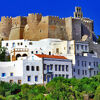10 Nights | GLORIOUS GREECE
You will visit the following 9 places:

Heraklion
Heraklion is the largest city and the administrative capital of the island of Crete. It is the fourth largest city in Greece. The Bronze Age palace of Knossos, also known as the Palace of Minos, is located nearby. Heraklion is close to the ruins of the palace of Knossos, which in Minoan times was the largest centre of population on Crete. Though there is no archaeological evidence of it, Knossos may well have had a port at the site of Heraklion as early as 2000 BC. Around the city can be found several sculptures, statues and busts commemorating significant events and figures of the city's and island's history, like El Greco, Vitsentzos Kornaros, Nikos Kazantzakis and Eleftherios Venizelos.

Katákolo
Katakolon, or Katakolo is a seaside town in the municipality of Pyrgos in western Elis, Greece. It is situated on a headland overlooking the Ionian Sea and separating the Gulf of Kyparissia from the rest of the Ionian. It is 11 km west of downtown Pyrgos. The small village of Agios Andreas, which in ancient times was the natural harbour for Ancient Olympia, lies northwest of Katakolo. A railway connects Katakolo with Pyrgos and Olympia, but along with the rest of the rail network in the Peloponnese, services have been suspended since 2011 for economic reasons.

Valletta
Valletta is the capital of Malta, colloquially known as Il-Belt in Maltese. It is located in the central-eastern portion of the island of Malta and the city proper has a population of 6,098. According to Eurostat, the larger urban zone of Valletta has a population of 368,250. Valletta contains buildings from the 16th century onwards, built during the rule of the Order of St. John of Jerusalem, also known as Knights Hospitaller. The city is essentially Baroque in character, with elements of Mannerist, Neo-Classical and Modern architecture in selected areas, though World War II left major scars on the city. The City of Valletta was officially recognised as a World Heritage Site by UNESCO in 1980. The city is named for Jean Parisot de la Valette, who succeeded in defending the island from an Ottoman invasion in 1565. $$https://www.youtube.com/watch?v=AGlRHAOUQvk$$

Rhodes
Rhodes is the largest of the Dodecanese islands in terms of land area and also the island group's historical capital. Administratively the island forms a separate municipality within the Rhodes regional unit, which is part of the South Aegean administrative region. It is located northeast of Crete, southeast of Athens and just off the Anatolian coast of Turkey. Rhodes' nickname is The island of the Knights, named after the Knights of Saint John of Jerusalem, who once conquered the land. Historically, Rhodes was famous worldwide for the Colossus of Rhodes, one of the Seven Wonders of the Ancient World. The Medieval Old Town of the City of Rhodes has been declared a World Heritage Site. Today, it is one of the most popular tourist destinations in Europe.

Piraeus
Piraeus is a city in the periphery of Attica, Greece and within the Athens urban area, located 12 km southwest of its center and upon the Saronic Gulf. According to the 2001 census, Piraeus has a population of 175,697 people within its administrative limits, making it the third largest municipality in Greece and the second within the Greek capital following the municipality of Athens. The Piraeus urban area extends beyond the administrative city limits to the suburban municipalities, with a total population of 466,065.

Santorini Airport

Taormina

Patmos
Patmos is a small Greek island in the Aegean Sea, most famous for being the location of both the vision of and the writing of the Christian Bible's Book of Revelation. Because of the Book of Revelation, Patmos has a long history as a destination for Christian pilgrimage. Visitors can see the cave where John is said to have received his Revelation (the Cave of the Apocalypse), and several monasteries on the island are dedicated to Saint John. In 1999, the island's historic center Chora, along with the Monastery of Saint John the Theologian and the Cave of the Apocalypse, were declared World Heritage Sites by UNESCO. The monastery was founded by Saint Christodulos. Patmos is also home to the Patmian School, a notable Greek seminary.

Gytheio
Gytheio is a town and a former municipality in Laconia, Peloponnese, Greece. Since the 2011 local government reform it is part of the municipality East Mani, of which it is a municipal unit. It was the seaport of Sparta, some 40 kilometres (25 miles) north. Gytheio used to be an important port until it was destroyed in 4th century AD, possibly by an earthquake. Today it is the largest and most important town in Mani. It is also the seat of the municipality of East Mani.









